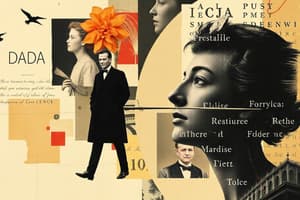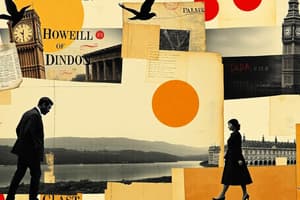Podcast
Questions and Answers
Which theme in English literature focuses on personal growth and understanding one's own identity?
Which theme in English literature focuses on personal growth and understanding one's own identity?
- Identity and Self-Discovery (correct)
- Nature and the Sublime
- Social and Political Critique
- Existentialism and Absurdity
Which literary device involves the use of hints or clues about future events in a narrative?
Which literary device involves the use of hints or clues about future events in a narrative?
- Foreshadowing (correct)
- Irony
- Imagery
- Metaphor
Which of the following literary movements is characterized by a focus on natural environments and emotional experiences?
Which of the following literary movements is characterized by a focus on natural environments and emotional experiences?
- Realism
- Surrealism
- Romanticism (correct)
- Naturalism
Which playwright is known for their contributions to modern drama, particularly in the genres of tragedy and comedy?
Which playwright is known for their contributions to modern drama, particularly in the genres of tragedy and comedy?
What is the main focus of existentialism as a theme in literature?
What is the main focus of existentialism as a theme in literature?
Which of the following best defines symbolism in literature?
Which of the following best defines symbolism in literature?
What is a notable characteristic of Old English literature?
What is a notable characteristic of Old English literature?
Which author is associated with the Renaissance period of English literature?
Which author is associated with the Renaissance period of English literature?
Which of the following works was written during the Restoration period?
Which of the following works was written during the Restoration period?
What is a primary feature of the Victorian Era in literature?
What is a primary feature of the Victorian Era in literature?
In which literary period did the concept of humanism prominently emerge?
In which literary period did the concept of humanism prominently emerge?
Which of the following poets is associated with the Romantic Period?
Which of the following poets is associated with the Romantic Period?
What literary technique is most commonly associated with Modernism?
What literary technique is most commonly associated with Modernism?
Which characteristic is typical of Postmodernism?
Which characteristic is typical of Postmodernism?
Flashcards are hidden until you start studying
Study Notes
Overview of English Literature
- Definition: English literature encompasses written works produced in the English language, including poetry, prose, and drama.
Historical Periods
-
Old English (450-1150)
- Notable Works: "Beowulf"
- Characteristics: Use of alliterative verse, epic themes, and heroic deeds.
-
Middle English (1150-1500)
- Notable Works: Chaucer's "The Canterbury Tales"
- Characteristics: Development of vernacular language, diverse genres.
-
Renaissance (1500-1660)
- Notable Authors: William Shakespeare, John Milton, Christopher Marlowe
- Characteristics: Humanism, exploration of individualism, complex characters.
-
Restoration and 18th Century (1660-1800)
- Notable Works: "Robinson Crusoe" by Daniel Defoe, works by Jonathan Swift
- Characteristics: Satire, social commentary, rise of the novel.
-
Romantic Period (1800-1850)
- Notable Authors: William Wordsworth, Samuel Taylor Coleridge, Percy Bysshe Shelley
- Characteristics: Emphasis on emotion, nature, and individualism.
-
Victorian Era (1837-1901)
- Notable Authors: Charles Dickens, George Eliot, Thomas Hardy
- Characteristics: Realism, social critique, morality, and family values.
-
Modernism (1900-1945)
- Notable Authors: James Joyce, Virginia Woolf, T.S. Eliot
- Characteristics: Stream of consciousness, fragmentation, existential themes.
-
Postmodernism (1945-Present)
- Notable Authors: Salman Rushdie, Thomas Pynchon, Margaret Atwood
- Characteristics: Irony, playfulness, questioning of narrative structures.
Genre Categories
-
Poetry
- Forms: Sonnet, free verse, haiku, narrative
- Key Poets: John Keats, Emily Dickinson, W.H. Auden
-
Prose
- Types: Novel, short story, essay, biography
- Key Novels: "Pride and Prejudice" by Jane Austen, "1984" by George Orwell
-
Drama
- Forms: Tragedy, comedy, tragicomedy
- Notable Playwrights: Harold Pinter, Tom Stoppard, Arthur Miller
Key Themes in English Literature
- Identity and Self-Discovery
- Social and Political Critique
- Nature and the Sublime
- Love and Relationships
- Existentialism and Absurdity
Important Literary Devices
- Imagery: Vivid descriptive language that appeals to the senses.
- Symbolism: Use of symbols to represent ideas or qualities.
- Foreshadowing: Hints or clues about what will happen later in the story.
- Irony: A contrast between expectation and reality.
- Metaphor: A figure of speech that makes a comparison between two unlike things.
Notable Literary Movements
- Romanticism: Focus on emotion and nature.
- Realism: Depiction of everyday life and society.
- Naturalism: Influence of environment and heredity on human behavior.
- Surrealism: Exploration of the unconscious mind and dream imagery.
Conclusion
- English literature reflects cultural, social, and historical contexts.
- It remains a vital field of study, revealing insights into human experience and society across time.
Overview of English Literature
- English literature includes poetry, prose, and drama written in the English language.
Historical Periods
- Old English (450-1150)
- Prominent work: "Beowulf"
- Features alliterative verse and themes of heroism.
- Middle English (1150-1500)
- Notable work: Chaucer's "The Canterbury Tales."
- Marked by the development of vernacular language.
- Renaissance (1500-1660)
- Key figures: William Shakespeare, John Milton, Christopher Marlowe.
- Emphasis on humanism and exploration of individuality.
- Restoration and 18th Century (1660-1800)
- Significant works: "Robinson Crusoe" by Daniel Defoe.
- Rise of the novel with satire and social commentary as defining traits.
- Romantic Period (1800-1850)
- Major authors: William Wordsworth, Samuel Taylor Coleridge, Percy Bysshe Shelley.
- Focused on emotion, nature, and individual expression.
- Victorian Era (1837-1901)
- Notable authors: Charles Dickens, George Eliot, Thomas Hardy.
- Characterized by realism and moral inquiry into family values and society.
- Modernism (1900-1945)
- Influential writers: James Joyce, Virginia Woolf, T.S. Eliot.
- Known for stream of consciousness narrative and themes of alienation.
- Postmodernism (1945-Present)
- Significant authors: Salman Rushdie, Thomas Pynchon, Margaret Atwood.
- Defined by irony, playful narrative, and questioning traditional storytelling.
Genre Categories
- Poetry
- Types: Includes sonnets, free verse, haikus, and narrative forms.
- Noteworthy poets: John Keats, Emily Dickinson, W.H. Auden.
- Prose
- Forms: Novels, short stories, essays, and biographies.
- Iconic novels: "Pride and Prejudice" by Jane Austen, "1984" by George Orwell.
- Drama
- Categories: Incorporates tragedy, comedy, and tragicomedy.
- Famous playwrights: Harold Pinter, Tom Stoppard, Arthur Miller.
Key Themes in English Literature
- Explores identity and self-discovery.
- Engages in social and political critique.
- Celebrates nature and the sublime.
- Investigates love and interpersonal relationships.
- Delves into existentialism and themes of absurdity.
Important Literary Devices
- Imagery: Utilizes descriptive language to evoke sensory experiences.
- Symbolism: Employs symbols to convey complex ideas.
- Foreshadowing: Provides hints regarding future plot developments.
- Irony: Demonstrates contrasts between expectations and reality.
- Metaphor: Compares unlike things to reveal deeper meanings.
Notable Literary Movements
- Romanticism: Highlights emotional depth and a connection to nature.
- Realism: Focuses on realistic portrayal of everyday life.
- Naturalism: Examines the influence of environment and heredity.
- Surrealism: Investigates the unconscious mind and dreamlike imagery.
Conclusion
- English literature serves as a mirror reflecting cultural, social, and historical contexts.
- It remains an essential area of study, offering insights into human experiences and societal developments over time.
Studying That Suits You
Use AI to generate personalized quizzes and flashcards to suit your learning preferences.




